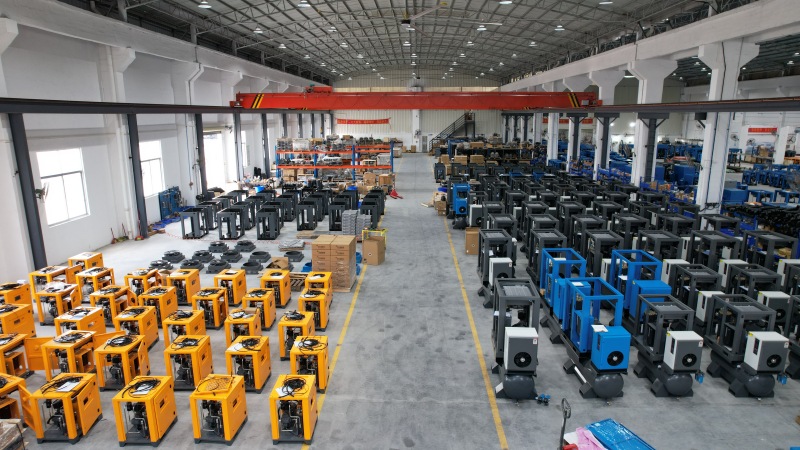Choosing the right
screw air compressor for your business can significantly impact efficiency, cost savings, and overall productivity. Whether you’re running a manufacturing plant, managing a healthcare facility, or overseeing a construction site, the right compressor is crucial. In this guide, we'll walk you through how to choose the best screw air compressor tailored to your business needs.

1. Key Considerations Before Choosing a Screw Air Compressor
Business Needs Assessment
Before purchasing a screw air compressor, you need to assess your business's specific air needs. Determine your air demand by calculating the required CFM (Cubic Feet per Minute) and PSI (Pounds per Square Inch), as well as how often you’ll be using the compressor. Businesses with high-pressure needs like factories or automotive workshops often require compressors with high PSI. If your business requires continuous operation, a larger compressor may be necessary.
Also, consider whether your operation is intermittent or continuous. Businesses with 24/7 air demand need compressors designed for continuous duty, while smaller operations can opt for models designed for less frequent use.
Oil-Injected vs. Oil-Free Compressors
One of the main decisions when selecting a screw air compressor is whether you need an oil-injected or oil-free model.
Oil-injected compressors are suitable for heavy-duty applications that don’t require absolute air purity. They provide reliable, cost-effective solutions for industries such as manufacturing and construction.
Oil-free compressors are ideal for industries requiring contamination-free air, such as food and beverage production, pharmaceuticals, and healthcare. While these are typically more expensive, the clean air they provide is necessary for meeting strict regulatory standards.
2. Key Features to Look for in a Screw Air Compressor
Energy Efficiency
In today’s business world, energy efficiency is paramount. Variable Speed Drive (VSD) technology is becoming increasingly popular for screw air compressors because it allows the machine to adjust its speed based on demand, significantly reducing energy costs. Choosing an energy-efficient compressor can save your business thousands of dollars in the long run. Ensure the compressor model you choose has an Energy Star certification or similar efficiency ratings.
Size and Capacity
The right compressor size depends on your air needs. If your business uses a lot of air tools or equipment, you’ll need a larger compressor with higher CFM and PSI ratings. Smaller businesses with less equipment may opt for a more compact model. The key is matching the compressor size with your specific air demand.
When selecting a compressor, you’ll need to consider both CFM (the amount of air delivered) and PSI (the pressure of the air). A compressor that doesn't meet the required specifications can result in inefficient operation or even damage to your equipment.
Noise Levels
Noise can be a significant concern, particularly in environments where employees work closely with the compressors. Look for models designed with noise reduction technology, such as quieter operation features and insulation. OSHA guidelines recommend that noise levels should not exceed 85 dB, and quieter compressors can also improve the working environment for your team.
Maintenance and Durability
Maintenance is an essential consideration when choosing a screw air compressor. Look for a model that’s designed to minimize downtime, with fewer moving parts and durable components. Additionally, check if the compressor manufacturer provides clear maintenance guidelines or if predictive maintenance features are available. Regular oil changes, filter cleaning, and condensate drainage can go a long way in extending the lifespan of your compressor.
3. Cost Considerations
Upfront Costs vs. Long-Term Savings
The initial price of a screw air compressor is only part of the equation. When considering a purchase, also take into account total cost of ownership (TCO). This includes energy costs, maintenance costs, repair expenses, and downtime. Energy-efficient models may have a higher upfront cost but will save you money in the long run through reduced electricity bills.
Additionally, consider the cost of servicing your compressor. Some compressors are designed to require less frequent maintenance, while others may need regular checkups that add to the overall cost.
Energy Efficiency and ROI
Investing in an energy-efficient compressor offers a strong return on investment (ROI). While the initial price may be higher, compressors with VSD technology or those that are more energy-efficient can cut energy consumption by up to 40%. This can result in significant savings for your business, especially if you run your compressor for long hours every day.
4. Industry-Specific Recommendations: Which Screw Compressor Fits Your Business?
Manufacturing & Heavy Industries
For manufacturing and heavy industries, you need a compressor capable of handling high air demand and continuous operation. These sectors often require compressors that can run nonstop and support machinery like CNC machines, pneumatic tools, and automation systems. Choose a high-CFM, high-PSI compressor for reliable, continuous service.
Food & Beverage
In the food and beverage industry, oil-free compressors are essential for preventing contamination. These compressors provide clean, dry air that complies with strict hygiene standards. Consider models that offer high performance without compromising air purity.
Healthcare & Pharmaceuticals
Oil-free screw compressors are also essential in healthcare and pharmaceuticals, where the quality of the air can directly affect patients' health or the effectiveness of medications. Look for models that meet regulatory standards and provide clean, reliable air in sensitive environments.
Construction and Automotive
For construction and automotive industries, consider portable screw compressors. These compressors need to be durable, compact, and capable of handling a variety of power tools and equipment in outdoor settings.
Conclusion
Choosing the right screw air compressor for your business involves understanding your needs, assessing available features, and calculating long-term costs. By selecting a compressor that meets your air demand, industry requirements, and operational budget, you can improve productivity and save money. Be sure to consult an expert for tailored recommendations to ensure a perfect fit for your business.
